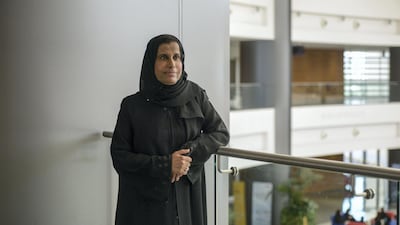A call has gone out for bright Emirati students to apply for a scholarship programme that could see them study at any of 4,000 US universities.
Registration for the Fulbright Foreign Student Programme for the 2019 — 2020 academic year opens next month but enrolment from the UAE has historically been poor.
The Fulbright Foreign Student Programme was started by the US government in 1946 to promote cross-cultural relations through international education exchange.
The programme has produced 43 Nobel Prize winners, 18 heads of states and 78 Pulitzer prize winners.
But since the Fulbright Grant for master’s study launched in the UAE in 2016, only 13 Emiratis have entered it.
The reason is because Emiratis are not familiar with the programme and tend to seek out government scholarships instinctively, said Rula Dajani, director of Amideast’s UAE branch, a non-profit international education company that administers the programme on behalf of the US embassy.
Unlike government sponsored scholarships, Fulbright applicants can attend any university and major in any subject of their choosing, with the exception of dentistry and pharmaceutical studies, said Charlotte Fadare, cultural affairs officer at the US embassy in the UAE.
“Often students are limited to majors and universities that the government approves, but with Fulbright they can go to any university and choose any major.”
Amideast representatives will be visiting universities across the country ahead of registration in a bid to encourage Emirati students to apply.
______________
Read more:
Adec to direct scholarships towards students pursuing in-demand careers
Emirati students missing out on opportunity for American scholarship
______________
The benefit of the programme extends beyond sponsorship, said Nadia Ziyadeh, media officer at the US embassy, the goal is for the student to then return to the UAE and apply what they studied at home.
"We meet with the alumni on a quarterly basis and they come from the private sector and governmental sector and NGOs, they get together and implement their own activities with our support," she said. "So the strength of alumni in the UAE is an important factor to use them as enablers."
Dr Fatima Al Shamsi, who graduated from the Fulbright senior researchers' programme in 1995, is one such enabler. The programme launched in the UAE in the 90s and since graduating, she has co-ordinated with a number of Fulbright scholars and brought them to the UAE to work on projects.
Dr Al Shamsi is now the vice deputy chancellor of Sorbonne Abu Dhabi.
“I went to the University of Baltimore as a senior Fulbrighter and I did my research on the rule of free zones in the UAE they had just emerged and it was a big thing back then, Jebel Ali free zone was my case study.”
Coming from a rich economic background and having earned her bachelor’s, master’s and PhD in economy at different universities around the world, Dr Al Shamsi was able to benefit from the programme to the fullest level.
“It was a very good experience because I was able to build many connections with other universities in Washington as well, like Georgetown and the American University in Washington.
“And whenever there was a conference or seminar, I would attend and build relations with the faculty who have interest in free zones in the Middle East.”
Upon her return to the UAE she continued to network.
“When I came back I was supporting the idea of inviting scholars to come to UAEU, and at that time I was the head of the economic department, and I brought two Fulbrighters to work with me in my department.
“It was out of extensive mutual interest, and we worked on a joint research that was published afterwards, this was one of the outcomes of building relations with other scholars at American universities.”


